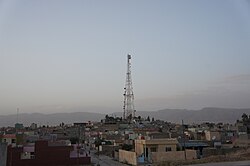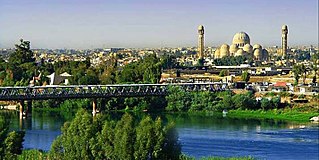
Nineveh or Ninawa Governorate is a governorate in northern Iraq. It has an area of 37,323 km2 (14,410 sq mi) and an estimated population of 2,453,000 people as of 2003. Its largest city and provincial capital is Mosul, which lies across the Tigris river from the ruins of ancient Nineveh. Before 1976, it was called Mosul Province and included the present-day Dohuk Governorate. The second largest city is Tal Afar, which has an almost exclusively Turkmen population.
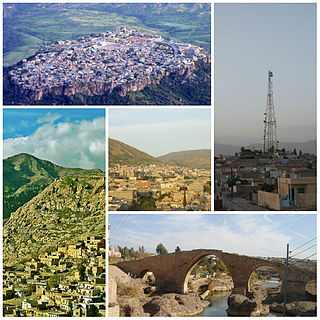
Duhok Governorate is a governorate in the autonomous Kurdistan Region of Iraq. Its capital is the city of Duhok. It includes Zakho, near the Ibrahim Khalil border crossing with Şırnak Province, Turkey. It borders the Al-Hasakah Governorate of Syria. It was established on 27 May 1969, previously part of Nineveh Governorate.

Duhok is a city in Kurdistan Region, Iraq. It is the capital city of Duhok Governorate.

Araden is a village in Dohuk Governorate in Kurdistan Region, Iraq. It is located in the Sapna valley in the Bamarni Sub-District of Amedi District.
Bebadi is a village in Dohuk Governorate in Kurdistan Region, Iraq. It is located in the Sapna valley in the district of Amadiya.
Dehi is a village in Dohuk Governorate in Kurdistan Region, Iraq. It is located in the Sapna valley in the district of Amadiya.
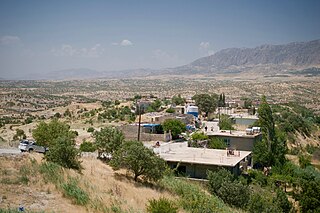
Sarsing is a town and sub-district in the Dohuk Governorate in Kurdistan Region, Iraq. It is located in the Sapna valley in the Amedi District.
Hezany is a village in Dohuk Governorate in Kurdistan Region, Iraq. It is located in the Nahla valley in the Amadiya District.
Avzrog is a village in Dohuk Governorate in Kurdistan Region, Iraq. It is located in the district of Simele.

Iraqi Assyrians are an ethnic and linguistic minority group, indigenous to Upper Mesopotamia. They are defined as Assyrians residing in the country of Iraq, or members of the Assyrian diaspora who are of Iraqi-Assyrian heritage. They share a common history and ethnic identity, rooted in shared linguistic, cultural and religious traditions, with Assyrians in Iran, Turkey and Syria, as well as with the Assyrian diaspora elsewhere. A significant number have emigrated to the United States, notably to the Detroit and Chicago; sizeable communities are also found in Sydney, Australia and Södertälje, Sweden.
Minorities in Iraq have been incredibly influential to the history of the country, and consist of various ethnic and religious groups. The largest minority group in Iraq is the Kurds, with Turkmen following shortly after. Prior to the 2003 invasion of Iraq, Assyrians constituted a sizeable population of 1.5 million, and belonged to various different churches such as the Assyrian Church of the East, Chaldean Catholic Church, and the Syriac Orthodox/Catholic Churches. Other minority groups in Iraq include Armenians, Mandaeans, Baha'i, and Marsh Arabs, among others.

The vast majority of Christians in Iraq are indigenous Assyrians who descend from ancient Assyria, and are considered to be one of the oldest continuous Christian communities in the world. They primarily adhere to the Syriac Christian tradition and rites and speak Northeastern Neo-Aramaic dialects, although Turoyo is also present on a smaller scale. Some are also known by the name of their religious denomination as well as their ethnic identity, such as Chaldo-Assyrians, Chaldean Catholics or Syriacs. Non-Assyrian Iraqi Christians include Arab Christians and Armenians, and a very small minority of Kurdish, Shabaks and Iraqi Turkmen Christians. Regardless of religious affiliation Assyrians Christians in Iraq and surrounding countries are one genetically homogeneous people and are of different origins than other groups in the country, with a distinct history of their own harking back to ancient Assyria and Mesopotamia.
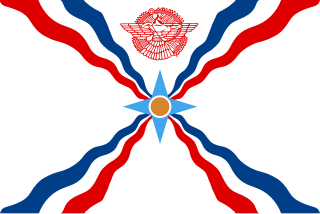
The Assyrian independence movement is a political movement and ethno-nationalist desire of ethnic Assyrians to live in their indigenous Assyrian homeland in northern Mesopotamia under the self-governance of an Assyrian State.
Sharanish is an Assyrian village in Dohuk Governorate in Kurdistan Region, Iraq. It is located near the Iraq–Turkey border in the district of Zakho. The village has two Chaldean Catholic churches, Mart Shmune and Mar Kiriakos, both parishes' namesakes being patron saints of Sharanish.
Dayrabun is a village in Dohuk Governorate in Kurdistan Region, Iraq. It is located near the confluence of the Iraq-Syria-Turkey border in the Zakho District.
Jelek is a village in Dohuk Governorate in Kurdistan Region, Iraq. It is located by the Little Khabur river in the district of Amadiya and the historical region of Barwari.
Kani Balavi is a village in Duhok Governorate in Kurdistan Region, Iraq. It is located in the district of Amadiya and the historical region of Barwari Bala.

Dooreh is a village in Dohuk Governorate in Kurdistan Region, Iraq. It is located near the Iraq–Turkey border in the Amadiya District and the historical region of Barwari.
Bakhetme is a village in the Dohuk Governorate in the Kurdistan Region, Iraq. It is located in the Simele District.

Deraluk is a town and subdistrict in Dohuk Governorate in Kurdistan Region, Iraq. It is located on the Great Zab and in the district of Amadiya.
